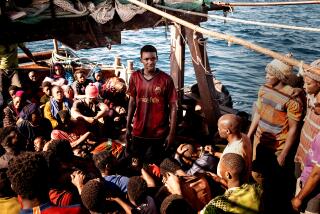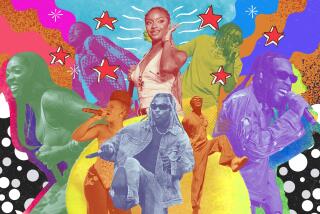SENEGAL’S AMBASSADOR TO POP
- Share via
West African pop vocalist Youssou N’Dour has a lot of friends in high places.
The Senegalese singer guests solo with Herbie Hancock and others at this afternoon’s edition of the “Jazzvisions” series at the Wiltern Theatre. But N’Dour has made even greater strides in the pop world this year by appearing on Top 10 albums by Paul Simon and Peter Gabriel.
He returns to Los Angeles Monday and Tuesday with his Super Etoile du Dakar band as the opening act at Gabriel’s Forum concerts. The British rocker not only features N’Dour on two songs in his own performance, but has been going on stage to introduce N’Dour’s set--an effort to defuse the impatience with which rock audiences often greet opening acts.
“I met Peter in 1984 in England when I was making a tour with my band,” related N’Dour, 27, by phone from Houston. The responses of N’Dour, who speaks French and the Senegalese tribal language Wolof, were relayed through a translator during the interview.
“After the show, Peter introduced himself and told me how impressed he was by the kind of music that I played. I went back home and later Peter followed me to Dakar (the capital of Senegal) and told me he was interested in having a show together with me.
“That show took place in London last year, after which Peter decided he and I should record the song ‘In Your Eyes’ together for his ‘So’ album. Our friendship has kept on growing from strength to strength and finally Peter wanted to make another tour with me so he could introduce me to the American audience.”
According to N’Dour, whose first U.S. album, “Nelson Mandela,” was just released by PolyGram, American audiences have been highly receptive to the hybrid pop style, derived from a Wolof tribal rhythm, that he calls “mbalax.”
“This is a new type of music for the American audience that they are just beginning to discover,” he observed. “I am an international figure. I use Senegalese music as a base with elements of foreign music--black American music, mainly--to internationalize the kind of music I play.”
N’Dour grew up in the heart of Dakar surrounded by traditional Senegalese music as well as the Cuban records that exerted a surprisingly strong influence on pop styles throughout West Africa. Another influence was closer to home--his mother and one grandfather were “gawlos,” a kind of “griot”--the village storyteller and troubadour who passes on the cultural heritage in African society.
“I realized at a very early stage that music was it ,” N’Dour asserted. “Music was my friend and my everything from the onset, and I knew I could benefit from music since I was very young. I believe that, with my music, I can be an ambassador for both Senegal and Africa as a whole.”
After a brief stint singing with a theatrical troupe, N’Dour turned to pop and had his first hit at 15. His popularity spread throughout western Africa, and by the early ‘80s he had formed Super Etoile du Dakar, the group of ten musicians and two dancers who will back him at the Forum.
On record, the “mbalax” sound is lightly textured and melodic, with rollicking horns and chattering guitars setting off N’Dour’s high- pitched singing. The familiar song structures may make his material more accessible to mainstream pop fans than the marathon grooves of a King Sunny Ade or Fela Anikulapo Kuti.
N’Dour has released three albums internationally, but most of his African releases are on cassette due to the rampant record bootlegging and lack of copyright laws there.
The material on the “Nelson Mandela” album ranges from a version of the Spinners’ “The Rubberband Man” (sung in English to court the international audience) to an original composition, “Wareff,” that reveals the influence of Islamic music on his singing. (Islam is the majority religion in Senegal, and N’Dour is a member of the Mourid sect.)
While N’Dour expressed interest in collaborating with American musicians to bring African music to a broad international audience, he doesn’t intend to turn his back on his native land.
“The messages I try to portray in my music are mainly relationships within the family and between friends,” he said. “I’m not politically inclined, but there are certain things going on in Africa that people have to talk about--like apartheid. Being an artist who is well known, I try to talk about things in Africa that people need to know throughout the world.”
More to Read
The biggest entertainment stories
Get our big stories about Hollywood, film, television, music, arts, culture and more right in your inbox as soon as they publish.
You may occasionally receive promotional content from the Los Angeles Times.








